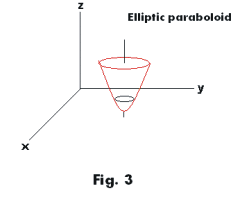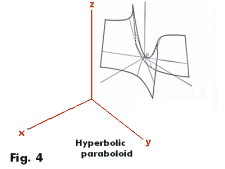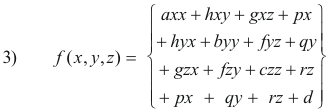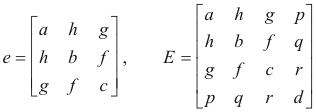
Website owner: James Miller
THE FUNCTION f(x, y, z) AND ASSOCIATED MATRICES e AND E
Associated with the general equation of the second degree
1) ax2 + by2 + cz2 + 2fyz + 2gxz + 2hxy + 2px + 2qy + 2rz + d = 0
is the function
2) f(x, y, z) = ax2 + by2 + cz2 + 2fyz + 2gxz + 2hxy + 2px + 2qy + 2rz + d
to which we now wish to direct our attention. For insight let us consider the counterparts of 1) and 2) for the case of two variables i.e. the equation
3) ax2 + 2hxy + by2 + 2gx + 2fy + c = 0
with which is associated the function

4) f(x, y) = ax2 + 2hxy + by2 + 2gx + 2fy + c
or, equivalently,
5) z = ax2 + 2hxy + by2 + 2gx + 2fy + c .
The function 5) is always a paraboloid (either an elliptic or hyperbolic paraboloid) which is symmetric about some vertical axis in 3-space. See Figures 3 and 4. The equation f(x, y) = 0, i.e. the equation 3) above, corresponds to the trace of 5) on the xy-plane. The trace on that plane is one of the 9 conics, a parabola, ellipse, hyperbola, or one of the limiting cases. The trace of 5) on the plane x = 0 is a vertical parabola. The trace on the plane y = 0 is also a vertical parabola.

A rotation of the coordinate system about the z-axis through the correct angle will always eliminate the xy term in 5) above. What angle? The same angle that eliminates the xy term in the equation f(x, y) = 0. The same rotational transformation that eliminates the xy term in the equation f(x, y) = 0 eliminates the xy term in the function z = f(x, y).
In the case where f(x, y) = 0 represents a central conic (ellipse, hyperbola) a translation by the proper amounts in the x and y directions will eliminate the terms in x and y of 5) above. What translation will do this? The same translation that will eliminate the x and y terms in the equation
ax2 + 2hxy + by2 + 2gx + 2fy + c = 0 .
Now the situation for the case of three variables is completely analogous. The function 2) above which we will write as u = f(x, y, z) can be viewed as a four-dimensional paraboloid in 4-space symmetric about some axis parallel to the u-axis. The equation f(x, y, z) = 0 , i.e equation 1) above, corresponds to the trace of u = f(x, y, z) on the xyz-plane and corresponds to one of the 17 quadric surfaces. The trace of this four-dimensional paraboloid u = f(x, y, z) on the plane x = 0 is a paraboloid symmetric about some axis parallel to the u-axis. Likewise its traces on the planes y = 0 and z = 0 are also paraboloids symmetric about some axis parallel to the u-axis. A rotation of the coordinate system about the u-axis by the proper amount (i.e. the proper rotation in xyz-space) will always eliminate the mixed (xy, yz, xz) terms in 2) above. What rotation will do this? The same rotation that eliminates the mixed terms in the equation f(x, y, z) = 0. The same rotational transformation that eliminates the mixed terms in the equation f(x, y, z) = 0 eliminates the mixed terms in the function u = f(x, y, z).
In the case where f(x, y, z) = 0 represents a central quadric (ellipsoid, hyperboloid) a translation by the proper amounts in the x, y and z directions will eliminate the terms in x, y and z of function 2) above. What translation will do this? The same translation that will eliminate the x and y terms in the equation
ax2 + by2 + cz2 + 2fyz + 2gxz + 2hxy + 2px + 2qy + 2rz + d = 0 .
Alternative way of viewing u = f(x, y, z). The function u = f(x, y, z) can also be viewed in another way. It can be viewed as a scalar point function which assigns a real number to each point P(x, y, z) in 3-space. We can then think of this function in terms of level surfaces where f(x, y, z) = c corresponds to that level surface in 3-space at which the function f(x, y, z) has the value c. Thus f(x, y, z) = 0 corresponds to that level surface in 3-space at which f(x, y, z) has the value 0.
Matrices e and E. The function
2) f(x, y, z) = ax2 + by2 + cz2 + 2fyz + 2gxz + 2hxy + 2px + 2qy + 2rz + d
can also be written in the form

or in the form
4) f(x, y, z) = (ax + hy + gz + p)x + (hx + by + fz + q)y + (gx + fy + cz + r)z + (px + qy + rz + d)
Associated with f(x, y, z) are two symmetric matrices

which will be seen to come directly from representation 3) above. These two matrices play an important role in the analysis of the general equation of the second degree.
Quadratic form. Of importance in connection with the function f(x, y, z) is the quadratic form
F(x, y, z) = ax2 + by2 + cz2 + 2fyz + 2gxz + 2hxy
which can be written as

or in matrix form as

Singular and non-singular quadric surfaces. A quadric surface is called singular or non-singular according as the determinant of E is singular or non-singular. The ellipsoids, hyperboloids, and paraboloids are non-singular. The other quadrics are singular.
Jesus Christ and His Teachings
Way of enlightenment, wisdom, and understanding
America, a corrupt, depraved, shameless country
On integrity and the lack of it
The test of a person's Christianity is what he is
Ninety five percent of the problems that most people have come from personal foolishness
Liberalism, socialism and the modern welfare state
The desire to harm, a motivation for conduct
On Self-sufficient Country Living, Homesteading
Topically Arranged Proverbs, Precepts, Quotations. Common Sayings. Poor Richard's Almanac.
Theory on the Formation of Character
People are like radio tuners --- they pick out and listen to one wavelength and ignore the rest
Cause of Character Traits --- According to Aristotle
We are what we eat --- living under the discipline of a diet
Avoiding problems and trouble in life
Role of habit in formation of character
Personal attributes of the true Christian
What determines a person's character?
Love of God and love of virtue are closely united
Intellectual disparities among people and the power in good habits
Tools of Satan. Tactics and Tricks used by the Devil.
The Natural Way -- The Unnatural Way
Wisdom, Reason and Virtue are closely related
Knowledge is one thing, wisdom is another
My views on Christianity in America
The most important thing in life is understanding
We are all examples --- for good or for bad
Television --- spiritual poison
The Prime Mover that decides "What We Are"
Where do our outlooks, attitudes and values come from?
Sin is serious business. The punishment for it is real. Hell is real.
Self-imposed discipline and regimentation
Achieving happiness in life --- a matter of the right strategies
Self-control, self-restraint, self-discipline basic to so much in life